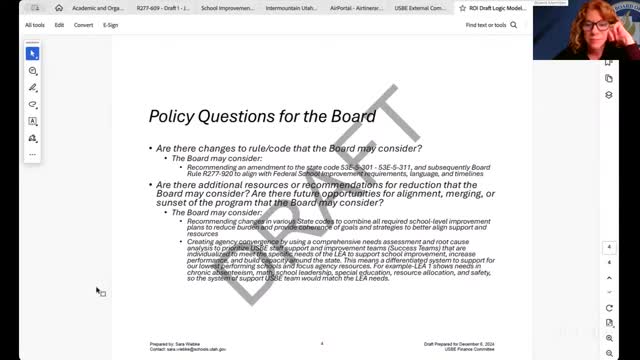Committee directs staff to draft state code changes and to develop needs‑assessment plan for school improvement

Summary
The finance committee directed staff to draft recommended state code changes to combine school‑level improvement plan requirements and separately asked staff to bring back recommendations and budget needs for a comprehensive needs assessment and root‑cause analysis; the latter passed with one dissent.
The Utah State Board of Education finance committee voted to direct staff to draft recommended changes in state code to combine required school‑level improvement plans and reduce duplicative reporting burdens. Separately the committee directed staff to develop recommendations and budget estimates for a comprehensive needs assessment and root‑cause analysis to prioritize state assistance to low‑performing schools.
Member Christina Boggess moved the first direction, asking staff to recommend changes “to combine all required school level improvement plans to reduce burden and provide coherence of goals and strategies to better align support and resources.” The committee voted that direction back to the finance committee for further development and review before presentation to the full board.
The nut graf: members said they wanted to reduce overlapping state and federal requirements and to centralize planning requirements where appropriate, while several members raised objections to codifying federal requirements into Utah statute.
Discussion focused on three options staff presented: (1) drafting an amendment to state code and board rule to align state language with federal school improvement requirements and timelines; (2) recommending state code changes to combine multiple school‑level plan requirements to reduce burden (the option the committee moved); and (3) directing staff to develop a list of recommendations and estimated budget needs for a more systemic, agency‑wide comprehensive needs assessment and root‑cause analysis (the second motion the committee approved separately).
Director Sarah Wiebke, director of school improvement, explained the current landscape of state programs (SpringBoard, the state designation aligned with the federal CSI designation, and Elevate, an opt‑in state program) and said staff had heard LEA concerns that overlapping requirements can create unnecessary burden for schools.
Member Valdez cautioned against “codifying” federal requirements into state law, arguing doing so could mean federal changes become permanently written into Utah code. Valdez said: “I just think it's not a prudent move. I don't think it's a good use of resources, and I think it's the ultimate cessation of our authority and our control here in our state.”
The committee approved the motion to direct staff to recommend state code changes (the option moved by Boggess) and then later approved a separate motion directing staff to develop a list of recommendations and budget needs for a comprehensive needs assessment and root‑cause analysis; the latter motion passed with Member Boggess recorded as opposed.
Ending: Staff will return to the finance committee with draft code language and with a more detailed proposal and budget for a needs‑assessment structure for committee consideration ahead of any board or legislative action.

